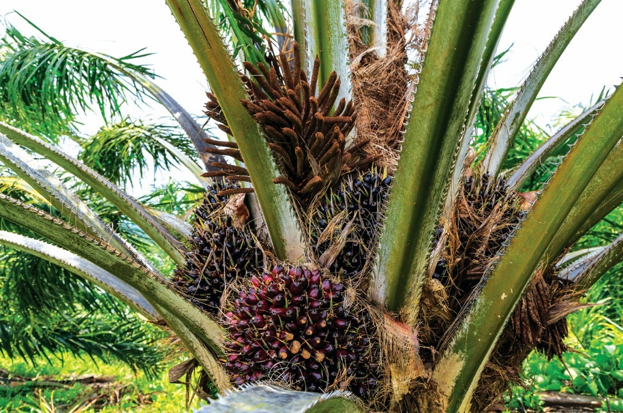Elaeis guineensis
Overview
The oil palm, belonging to the genus Elaeis in the palm family (Arecaceae), is a tree that has a long evolutionary history, with fossils dating back to the Cretaceous period. It is considered one of the oldest families of flowering plants. The oil palm is renowned as one of the most productive oil crops, capable of yielding a significantly higher amount of oil from its fruit compared to soybeans, earning it the name "oil palm". Despite occupying only 5% of the world's total vegetable oil acreage, palm oil constitutes 33% of the global vegetable oil market and 45% of the edible oil market.

Geographical Distribution
The oil palm is distributed within the latitudes of 10°S to 15°N, predominantly in the lowland areas below 150 meters above sea level. It is commonly found along the edges of humid forests in Africa, particularly in western and central Africa, as well as in Malaysia and Indonesia in Asia. In addition, it is also distributed in the northern parts of South America and Central America.
China has introduced and cultivated oil palm mainly in the regions of Hainan, Yunnan, Guangdong, and Guangxi.
Application
- Edible use: The oil palm fruits yield palm oil, while palm kernel oil is extracted from the palm kernels. Both oils are high-quality edible oils. They can be refined to produce premium-grade cream, chocolate candies, and serve as substitutes for cocoa butter and oil in ice cream. Additionally, the liquid juice that flows out from mature inflorescences can be used for wine production.
- Feed use: Palm oil cake can be utilized as animal feed.
- Other industrial raw materials: In industry, oil palm is used to produce high-quality soap, etc. The fruit shells can be processed to obtain acetic acid and methanol, and they can also be used in the production of activated carbon and fiberboard.
- Landscape use: Oil palms are suitable for greening environments in parks, campuses, scenic areas, and office spaces.
Genome sequencing
Elaeis guineensis, native to West and Southwest Africa, is the primary source of palm oil. In 2013, the Malaysian Palm Oil Board used Roche/454 and Sanger BAC end-sequencing technologies to assemble a total of 40,072 scaffolds, with a scaffold N50 of 1.26 Mb. Additionally, transcriptome data from 30 different tissue types were utilized to predict a minimum of 34,802 genes.
Ong et al. from the Department of Biotechnology and Breeding, Sime Darby Plantation Research and Development Centre, School of Biological Sciences, University of Nottingham, UK and School of Biological Sciences, University of Nottingham, Malaysia published an expanded version of the E. guineensis genome using linkage-directed genome assembly to improve the reference genome described above. The newly assembled genome, referred to as PMv6, has an N50 of 83.1 Mb, increasing the scaffold assignment of oil palm pseudomolecules from 43% to 77% (1.2 Gb). On average, each pseudomolecule in the PMv6 genome was assembled with 142 scaffolds with an average length of 73.7 Mb, compared to only 19 scaffolds with an average length of 41.1 Mb reported by Singh et al. in 2013.
Deli dura originates from four palm trees planted at the Botanic Gardens of Buitenzorg in 1848. It is characterized by thick endosperm, high bunch count, and high mesocarp oil content. It has become a crucial genetic resource in major breeding programs in Southeast Asia. The genome of Deli dura was sequenced and assembled by the Temasek Life Sciences Laboratory at the National University of Singapore. They used Illumina HiSeq 2500, MiSeq, and Roche 454 sequencing technologies, resulting in a draft genome size of 1.701 Gb, covering 94.49% of the oil palm genome. The assembly comprised 10,971 scaffolds, with an N50 size of 0.76 Mb. Gene annotation analysis predicted the presence of 36,105 genes.
Reference
1. 陈伟文,潘登浪,林位夫,等. 不同驯化移栽因素对油棕组培苗成活的影响[J]. 热带作物学报,2022,43(10):2057-2062. DOI:10.3969/j.issn.1000-2561.2022.10.011.
2. 王晨. 油棕种质资源产量性状鉴定评价及棕榈酸关联分析[D]. 湖北:华中农业大学,2015.
3. 曾宪海,焦云飞,廖子荣,等. 广东不同地区油棕叶片解剖结构观察与评价[J]. 热带作物学报,2018,39(11):2176-2185. DOI:10.3969/j.issn.1000-2561.2018.11.010.
4. 李文辉. 2000—2018年东南亚地区油棕榈种植时空分布规律及驱动力分析[D]. 兰州交通大学,2020.
5. 徐露,刘养洁. 世界油棕生产贸易的时空格局演变及发展预测[J]. 世界地理研究,2012(3):70-76. DOI:10.3969/j.issn.1004-9479.2012.03.007.
6.Singh R, Ong-Abdullah M, Low ET, et al. Oil palm genome sequence reveals divergence of interfertile species in Old and New worlds. Nature. 2013;500(7462):335-339. [OpenLBID: OLB-PM-23883927]
7.Ong AL, Teh CK, Mayes S, Massawe F, Appleton DR, Kulaveerasingam H. An Improved Oil Palm Genome Assembly as a Valuable Resource for Crop Improvement and Comparative Genomics in the Arecoideae Subfamily. Plants (Basel). 2020;9(11):1476. [OpenLBID: OLB-PM-33152992]
8.Jin J, Lee M, Bai B, et al. Draft genome sequence of an elite Dura palm and whole-genome patterns of DNA variation in oil palm. DNA Res. 2016;23(6):527-533. [OpenLBID: OLB-PM-27426468]
| Data Statistics | |
|---|---|
| Taxonomy ID | 51953 |
| Projects | 12 |
| Samples | 240 |
| Genomes | 1 |
| Variations | 25,181,762 |
| Expressions | 10 |
| Reference | oil_palm_African |
| Refgenes | 32,097 |
| Cultivars | 91 |